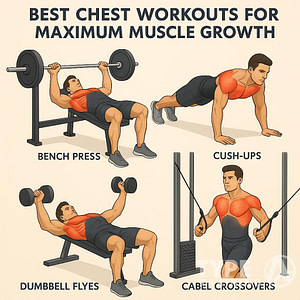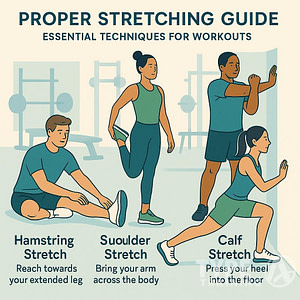Determining the ideal time for exercise isn’t one-size-fits-all. It’s essential to consider one’s personal daily schedule, energy levels, and goals. Scientific studies suggest varying benefits for working out at different times of the day. Morning workouts may help with consistency and kickstarting the metabolism, while afternoons might offer peak physical performance. Evening routines could align better with night owls or those looking to wind down after a long day.
Ultimately, the best time to work out hinges on one’s individual circadian rhythm and lifestyle. It’s crucial to weigh the pros and cons of different times of the day, such as the energizing effects of morning exercise against the potential for greater strength output later in the day. Personal preference also plays a significant role; choosing a time that fits comfortably with one’s daily routine is likely to encourage regularity and long-term adherence. For those exploring fasted versus fed state training, the timing of meals relative to exercise can influence the decision as well.
Key Takeaways
- Exercise benefits can vary based on the time of day and an individual’s consistency.
- Personal circadian rhythm and preferences play a critical role in determining the most suitable workout time.
- Aligning workouts with individual lifestyle and goals is key to maintaining a regular exercise routine.
Understanding Your Circadian Rhythm
Popular posts:
Your circadian rhythm plays a vital role in determining optimal physical performance throughout the day, influencing both muscle function and cortisol levels.
Influence on Exercise Performance
Circadian rhythms are internal clocks running in the background of the brain, cycling between sleepiness and alertness at regular intervals. They are crucial for determining the high- and low-performance phases within a 24-hour period. Research suggests that exercise at certain times, such as 7 a.m. or between 1 p.m. and 4 p.m., can advance the body clock, potentially leading to improved alertness and early onset of activities the following day.
Impact on Muscle Function and Cortisol Levels
The body’s internal clock directly impacts muscle function. Typically, muscle strength can vary at different times, with peaks often occurring in the late afternoon when body temperature is highest. Additionally, circadian rhythms regulate the release of cortisol, a hormone that affects energy and stress levels. Cortisol levels typically peak in the early morning and gradually decline throughout the day, coinciding with muscle recovery and function. Understanding how circadian rhythms affect cortisol is crucial for tailoring workout timing to maximize muscle function and recovery post-exercise.
Benefits of Morning Workouts
Morning workouts can be a strategic choice for those aiming to enhance their metabolism and improve mental alertness for the day ahead. Initiating exercise first thing in the morning can tap into physiological rhythms that promote fat burning and cognitive sharpness.
Kickstarting Metabolism and Burning Fat
One can harness the early hours to kickstart the metabolism. Studies suggest that engaging in morning exercise may boost the resting metabolic rate, allowing individuals to burn more fat throughout the day. This process is thought to be influenced by increased post-exercise oxygen consumption when one exercises in the morning. The Healthline article highlights morning exercise as a potential accelerator of fat loss relative to evening workouts.
Boosting Mood and Cognitive Functions
Morning exercise doesn’t just prime the body; it also sets a positive tone for the mind. Morning workouts trigger the release of endorphins, enhancing mood and creating a sense of well-being. Additionally, as stated in Health, morning physical activity can foster mental clarity and improved cognitive function. The rise in cortisol levels, which occurs naturally in the morning, may further optimize the body for both exertion and alert processing, potentially improving mental performance throughout the day.
Afternoon Exercise Advantages
Exercising in the afternoon may tap into the body’s physiological rhythms, offering enhancements in performance and alignment with daily energy fluctuations.
Optimal Physical Performance
Research indicates that peak power and physical performance tend to be at their highest in the afternoon. This is attributed to the body’s increased core temperature, which improves muscle function and strength, enzyme activity, and endurance. These factors may contribute to a more effective and efficient afternoon workout.
Alignment with Natural Energy Peaks
Many individuals experience a natural energy surge during the afternoon, which aligns well with the scheduling of an afternoon workout. This period is characterized by heightened alertness and focus, which can lead to a more engaged and higher-quality exercise session.
Evening Workouts and Body Rhythms
Engaging in physical activity during the evening can align with the body’s natural circadian rhythms to potentially enhance physical performance and influence sleep patterns.
Enhanced Strength and Endurance
Research suggests that the body’s core temperature is higher in the evening, which can lead to improved muscle function and strength, as well as increased endurance. Evening workouts might allow individuals to perform more efficiently and with greater power. This period is also when muscle flexibility peaks, which could decrease the risk of injuries during high-intensity activities.
Effect on Sleep and Recovery
Contrary to some beliefs, exercising in the evening may not necessarily disrupt sleep and could, for some individuals, lead to better quality sleep. Engaging in moderate-intensity workouts can promote faster onset of deep sleep. However, high-intensity training too close to bedtime could have a stimulating effect, which may delay sleep. Therefore, timing and intensity are crucial factors in how evening workouts impact sleep and recovery.
Fasted Versus Fed State Training
When individuals consider the timing of exercise, they often grapple with whether to train on an empty stomach or after a meal. This choice can potentially affect energy levels, performance, and the body’s metabolic response to exercise.
Morning Workouts on an Empty Stomach
Morning workouts often fall into the category of fasted state exercise, which occurs when individuals exercise after an overnight fast. As glycogen stores might be lower, the body may turn to fat as a fuel source. Proponents of fasted morning exercise argue that this state can lead to increased fat oxidation, although research offers mixed results on whether this leads to greater fat loss over time. Some individuals experience a significant sensation of hunger during morning workouts, which could impact the intensity and duration of their exercise.
- Benefits:
- Potentially increased fat oxidation
- May improve the body’s adaptations to endurance training
- Considerations:
- Could lead to impaired workout performance due to low energy
- Risks of increased muscle catabolism if not managed properly
- Important to hydrate, as the body is in a dehydrated state upon waking
Effects of Pre-workout Nutrition
On the contrary, entering a fed state with pre-workout nutrition can elevate blood sugar levels, supplying the muscles with immediate energy. For many individuals, consuming a balanced meal a few hours before exercise could enhance performance, especially in high-intensity workouts. The presence of food in the system can also prevent excessive hunger pangs that might occur during a workout and helps maintain stable energy levels.
- Benefits:
- Enhances performance due to available glucose for energy
- Helps in maintaining high intensity and longer duration workouts
- May safeguard muscle tissue by providing adequate amino acids
- Considerations:
- Timing and composition of a pre-workout meal are crucial—sugars can lead to an energy crash while too much fat and fiber can cause gastrointestinal discomfort
- The size and timing of the meal can affect comfort and performance — a smaller meal or a snack is often recommended 30 to 60 minutes before exercising.
Individual preferences and goals greatly influence the decision of whether to exercise in a fasted or fed state. Some may opt for a light snack to ward off hunger during morning workouts, while others may find that morning exercise on an empty stomach suits their body’s rhythm better.
Related: Intermittent Fasting Guide for Beginners: Get Started Now!
Impact of Workout Timing on Health
Choosing the right time to engage in physical activity can significantly influence one’s health outcomes. Research shows that particular times of day can enhance the effectiveness of exercise for weight management and various health improvements.
Influence on Weight Loss and Heart Health
Morning exercise may have a specific edge for individuals looking to reduce body fat and boost heart health. A study led by a professor at Skidmore College found that morning workouts could be optimal for belly fat loss. Engaging in fitness activities early in the day might kickstart the body’s metabolism, potentially leading to more effective fat burning throughout the day. Additionally, because of lesser distractions and commitments during the early hours, morning exercisers tend to be more consistent, which is critical for sustained heart health.
Managing Blood Pressure and Diabetes
Regular physical activity is a cornerstone in managing high
Considering Personal Preferences and Lifestyle
When planning workouts, it is crucial to consider an individual’s lifestyle, commitments, and personal inclinations. These elements significantly influence discerning the ideal time for exercise that aligns with one’s daily routine and fitness objectives.
Working Out for Wellness and Productivity
The time of day a person chooses to exercise can have a direct impact on their overall wellness and ability to remain productive. Morning workouts, for instance, are linked with enhanced sleep quality, improved mood, and increased alertness throughout the day. They are often recommended for those looking to kickstart their day with energy and focus. Conversely, afternoon or evening workouts might better suit individuals seeking to decompress after a long day or energize a sluggish afternoon.
Customizing Your Schedule for Optimal Gains
Personalizing workout times is essential for those with specific fitness goals, such as building muscle or getting stronger. An optimal time to train is not one-size-fits-all; it depends on when a person feels strongest and most motivated. For some, that might be during the late afternoon peak of the body’s circadian rhythm when performance potential is at its height. Aligning workout times with personal energy levels and muscle recovery rates can make a significant difference in the effectiveness of a fitness regimen.
Challenges of Different Workout Times
Selecting the ideal time to work out is a nuanced process that often involves weighing the pros and cons of one’s personal schedule and physical readiness against the natural ebbs and flows of the body’s capabilities throughout the day.
Morning vs. Evening Differences
Morning workouts often pose the challenge of low fuel levels, as the body may not have enough energy from food consumed, which leads to using energy reserves that can interrupt deep sleep cycles. Exercising in the morning might require a longer warm-up because the body is transitioning from a state of rest, and muscle stiffness is more common after sleep. The need to wake up much earlier to allocate time for exercise could also disrupt deep REM sleep, potentially impacting overall sleep quality.
In contrast, evening workouts can capitalize on the body’s natural muscle strength, which tends to peak later in the day. The body’s core temperature is higher and hormones like testosterone and cortisol are at optimal ratios for muscle growth and exercise performance in the afternoon and evening.
Physical Limitations and Environmental Factors
Environmental factors, such as gym opening times or daylight hours, can also significantly impact the feasibility of workout schedules. These factors must be considered alongside physical limitations, like personal energy ebbs and flows or commitments to work and family. Some individuals may find that their energy levels and focus peak in the afternoon and may benefit more from later workouts, which can leverage the increase in muscle temperature to enhance performance and potentially reduce injury risk. However, scheduling evening exercise too close to bedtime might interfere with some individuals’ sleep cycles due to the stimulating effect of physical activity.
Optimizing Workouts: Harnessing Your Circadian Rhythm
The human body operates on a biological schedule known as the circadian rhythm, which can influence physical performance. Understanding one’s own circadian rhythm can lead to optimized workout timing. Individuals can leverage this cycle to enhance their workout results.
Morning Workouts: Some people may find they perform best in the morning, when cortisol levels rise and peak. Morning exercise can kickstart metabolism and increase alertness. However, it’s important to note that body temperature and muscle strength may not have reached their daily peak during the early hours, potentially making warm-up routines more critical.
Afternoon Exercise: Research indicates that optimal strength and performance often peak in the late afternoon, when the body’s temperature is higher. Activities involving fine motor control or endurance are particularly well-suited to this time frame. The late afternoon may be the ideal period for attaining peak athletic performance.
Evening Training: Evening sessions can also be effective, taking advantage of sustained high body temperature. One must weigh the benefits against potential sleep disturbances, as intense workouts too close to bedtime may impair sleep quality.
| Time of Day | Considerations |
|---|---|
| Morning | Wake-up cortisol spike, warm-up needed |
| Afternoon | Peak body temperature, strength, and coordination |
| Evening | High body temperature, potential sleep disruption |
By aligning workout times with their circadian rhythm, individuals can capitalize on natural fluctuations in energy, strength, and endurance. Respecting one’s body clock can enhance performance and recovery, making workouts more efficient and potentially more enjoyable.
Frequently Asked Questions
Selecting the most appropriate time for exercising can have different implications on fitness and weight loss goals, making it a common concern for individuals dedicated to improving their health and well-being.
How does morning exercise influence weight loss effectiveness?
Morning exercise has been linked to enhanced weight loss effectiveness. Exercising in the early hours can kickstart the metabolism and may lead to increased energy expenditure throughout the day.
How does the circadian rhythm affect exercise performance?
The circadian rhythm, or the body’s internal clock, significantly impacts exercise performance. It dictates one’s body temperature, hormone levels, and heart rate, all of which contribute to optimal workout results when aligned correctly.
Does working out in the evening have benefits for losing weight?
Working out in the evening can have benefits for weight loss, as some individuals may have more strength and endurance later in the day due to the body’s temperature peak, which can lead to a more intense and longer workout.
What are the advantages of exercising at night?
Exercising at night can help reduce stress, and can also be beneficial as muscles are warmer and more flexible, potentially decreasing the risk of injuries and increasing performance quality.
How can the time of day impact fat loss, particularly belly fat?
The time of day can impact fat loss, including belly fat, since hormonal fluctuations throughout the day can affect fat oxidation rates. Morning may be advantageous due to fasting conditions.
What time of day do fitness experts recommend for optimal workout efficiency?
Fitness experts often recommend working out during the time when one feels most energetic and committed, which for many could be in the afternoon when the body is more warmed up and performance potential is higher.
Are there specific benefits for women to work out at certain times?
There are specific benefits for women to work out at times that align with their hormonal fluctuations across the menstrual cycle, which can influence energy levels and exercise recovery.















